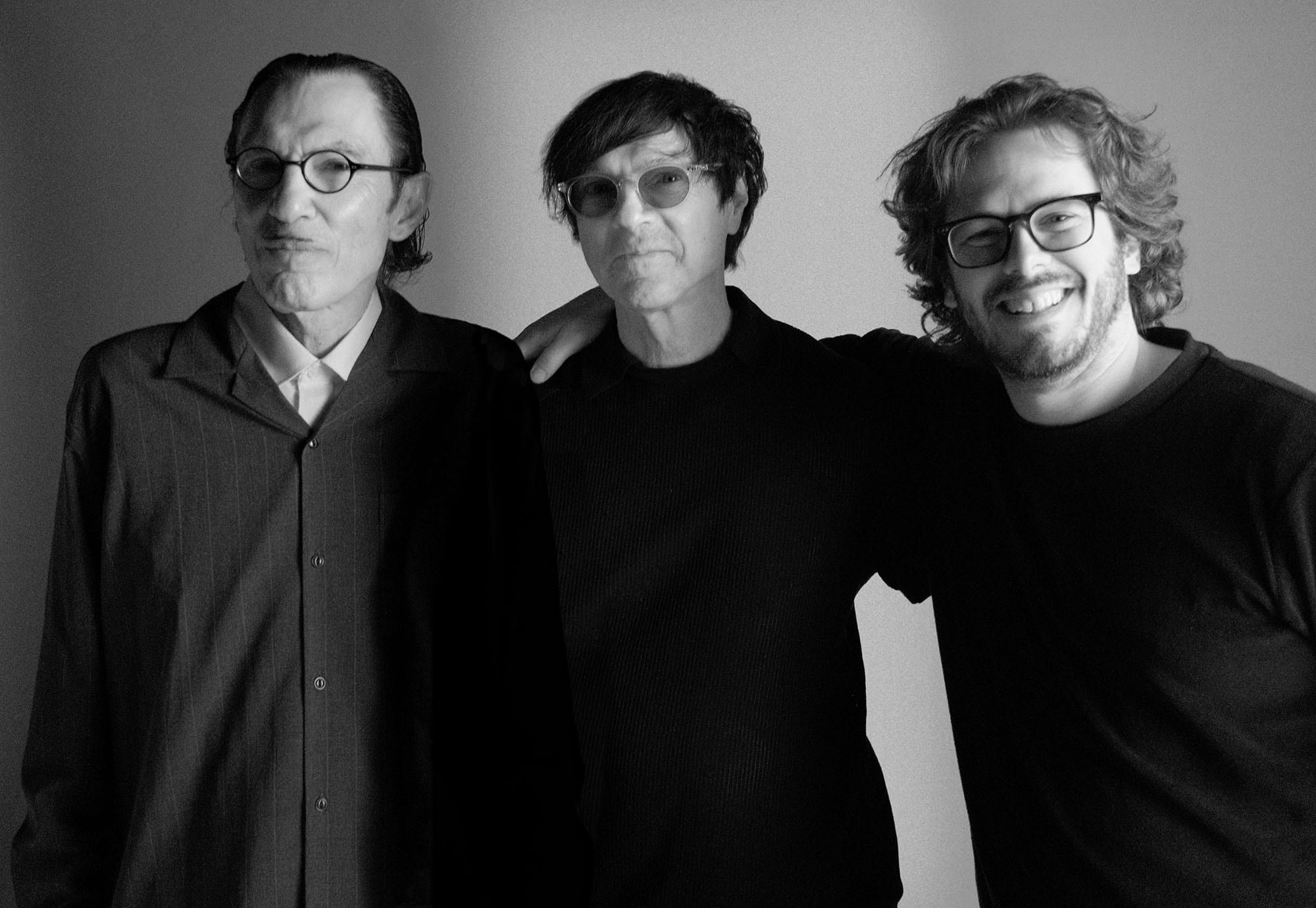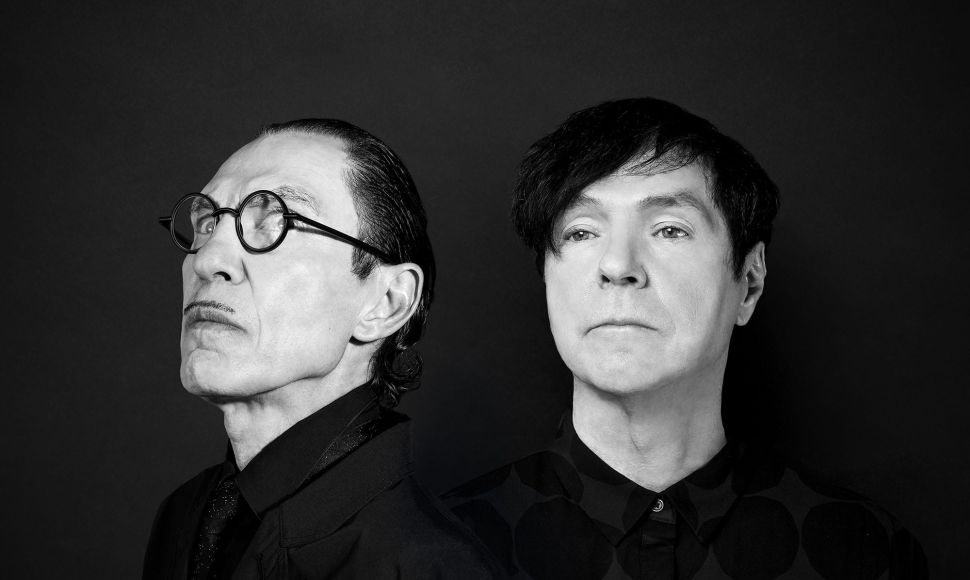
Brothers Ron and Russell Mael in director Edgar Wright’s film The Sparks Brothers, which debuts in theaters June 18. Anna Webber / Focus Features
No one forgets their first time falling in love, and nowhere is that more evident than screenwriter/director Edgar Wright’s (Baby Driver, Shaun of the Dead) first-ever documentary, The Sparks Brothers, a star-studded jubilant love letter to Sparks, in which everyone remembers their first time vividly — their first time falling for Sparks, that is. Indeed, it was Sparks’ 1974 groundbreaking appearance on the British TV show Top of the Pops, where they performed “This Town Ain’t Big Enough for Both of Us,†that made instant fans out of Björk, The Sex Pistols, and Duran Duran, to name just a few famous musicians who were instantly captivated by Ron Mael (songwriter/keys) and his younger brother Russell (vocals), aka, Sparks.
In sharp contrast to Top of the Pops appearances by Swedish pop sensations ABBA and The Wombles, a British novelty pop act (dressed as characters from The Wombles, a children’s TV show based on a children’s storybook), Sparks’ debut performance came directly out of left field. Ron, with slicked back hair and a mustache often compared to Hitler’s, wearing a button-down shirt and necktie as if he wandered onstage directly from his office job, sat stiffly playing his keyboard, periodically staring directly into the camera ominously. Meanwhile, shaggy-haired Russell, bare-chested beneath a blazer and a scarf tied around his neck, and looking like T. Rex singer/songwriter Marc Bolan, danced on the spot, complete with stationary marches and his arm raised high in the air, like a possessed commander leading a glam rock army. Beyond the stark visual contrast between the brothers, Sparks’ progressive brand of glam rock—with Russell’s high-pitched vocals singing Ron’s bizarre lyrics, including, “As twenty cannibals have hold of you, they need their protein just like you doâ€â€”left viewers mesmerized. The single sold like hotcakes.
“Nobody who saw it forgot it, and also tons of people in the audience were about to be the next wave of big musical heroes,†Wright tells Observer over a Zoom call. “It’s just amazing to think that one TV show on that one Thursday night, just sitting at home watching it were Joy Division, Duran Duran, The Sex Pistols, Siouxsie (and the Banshees), Depeche Mode, and they all take a little something from it.â€
“To have a Beatle doing an impression of you, I almost retired at that moment.â€
–Ron Mael
But while Sparks’ influence spans generations of artists across myriad music genres, including new wave, punk, rock and dance, mainstream fame has always eluded the California-born and raised duo who are, paradoxically, ubiquitous and yet significantly overlooked. Almost inconceivably, Wright’s documentary reveals there was even a period where radio stations accused Sparks of ripping off the bands that, in fact, they’d influenced. Not only that, but the musician Beck notes in the documentary, which arrives in theaters today, that there are probably current bands who are unaware that their musical lineage traces back to Sparks.
Still, Sparks have had a noteworthy and enviable career, regarded as much for their music as their cinematic videos and artful and often irreverent album covers. Even Paul McCartney took notice, paying homage to Sparks when he imitated Ron (among others) in his “Coming Up†music video in 1980. “To have a Beatle doing an impression of you, I almost retired at that moment,†says Ron Mael over Zoom.
Formed in the late ‘60s and originally called Halfnelson, Sparks renamed themselves in the early ‘70s. When their first two electronic records failed to make a commercial dent in the American market, Sparks moved to England where they experienced their breakthrough moment with their third record, the glam rock and pop-infused, Kimono My House (1974), produced by Muff Winwood, yielding Sparks’ breakthrough single “This Town Ain’t Big Enough for Both of Us†and its follow up track “Amateur Hour.†However, when they lost momentum in the U.K., Sparks moved back to the United States where they’ve been making records ever since.
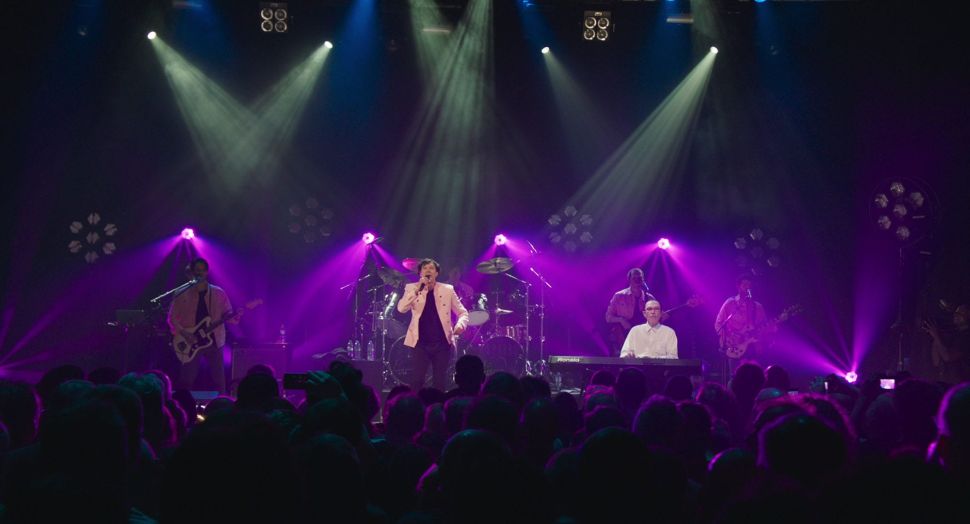

Sparks in concert from director Edgar Wright’s film The Sparks Brothers. Courtesy of Focus Features
Though they’ve never been as popular in their native homeland as elsewhere, Sparks have had some success in the United States with several songs including their collaboration with Jane Wiedlin (The Go-Go’s) on new wave track “Cool Places†(1983) and, later, with their electronic dance single “When Do I Get to Sing ‘My Way’†(1994), an even bigger hit overseas, where Sparks have always made a much bigger splash with their music, landing on music charts in the U.K., Germany, France, Australia, The Netherlands, Belgium and Switzerland.
“A lot of the Sparks music is totally sincere in its songcraft and its emotions, and yet they still have fun with the form, and I guess I do a similar thing with my movies.â€
–Edgar Wright
Lyrically quirky, complex and clever, Sparks songs often lovingly lampoon songwriting, their career, and pop culture. For example, their song “Lighten Up, Morrissey†(2008) quips “if only Morrissey weren’t so Morrissey-esque.†Still, as sincere as they are hilarious, Sparks also address important social issues, typically couching their messages in irony. And though you won’t find a Sparks traditional love song, their lyrics often encapsulate the desire for romantic love and the yearning for human connection, albeit from the vantage point of an outsider.
There is much opining in the documentary about why Sparks have never been better-known in the United States, including Flea’s speculation that their sense of humor has prevented them from being taken seriously. At the same time, Wiedlin says they have been “too much for America.†Others suggest they’ve been unfairly dismissed as a weird novelty act, while some surmise that the general public can’t fully comprehend Sparks’ approach.
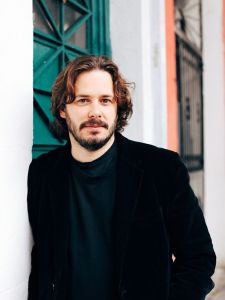

Edgar Wright Focus Features
“They take something that seems to be really great and arty, and they shoot it in the pants. Other times, people think they’re making fun of something when they’re deadly serious. They’re kind of inscrutable, those guys,†says former Sparks guitarist Earle Mankey.
Having worked with a diverse group of legendary record producers, including Todd Rundgren (XTC), Tony Visconti (David Bowie), and Giorgio Moroder (Donna Summer), the chameleon-like act is often musically unrecognizable from one era to the next. Wright deftly demonstrates that the riddle surrounding the enigmatic Sparks is also its answer. Are Sparks glam, pop, electronica, rock, dance, operatic, swing or orchestral? Are they lyrically sincere, satirical, irreverent, whimsical, serious, poignant, funny, perverse or sweet? Yes, indeed.
Wright aims to ignite Sparks’ long-overdue universal comeuppance with The Sparks Brothers, a filmed mélange of humor, earnestness and reverence, and a heartwarming ode to brotherhood. His engaging documentary, which doesn’t feel nearly as long as its approximately two-and-a-half-hour runtime, is a treat made both for Sparks enthusiasts and those who have never heard of Sparks at all. “A lot of music documentaries are a bit exclusive in terms of them preaching to the choir. They’re for fans only,†says Wright. “The idea of this documentary is it had to be as much an introduction as it was a celebration.â€
Wright tells Sparks’ story utilizing old photos and film footage spanning their five decades-long career, animation, commentary by the Maels, and a whopping eighty interviews with producers (Todd Rundgren, Tony Visconti, Giorgio Moroder), comedians (Patton Oswalt, Adam Buxton), actors (Mike Myers, Jason Schwartzman), musicians (Nick Rhodes and John Taylor/Duran Duran, Steve Jones/The Sex Pistols, Beck), former Sparks bandmates, record executives, and more.
In two video calls conducted several days apart, Sparks and Wright spoke separately with Observer about The Sparks Brothers, Sparks’ unique journey and their mutual admiration for one another.
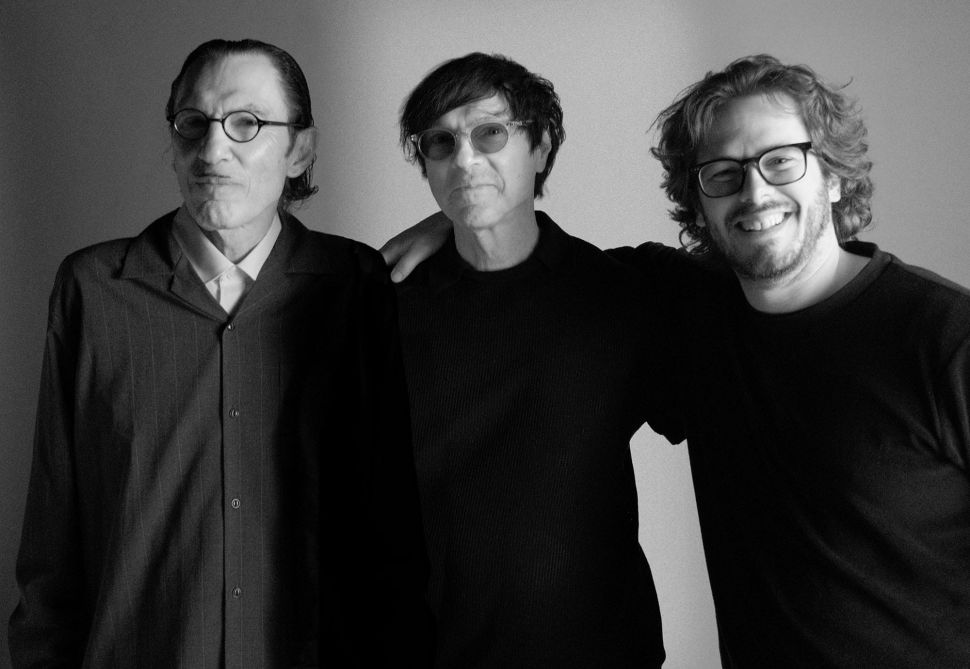

Brothers Ron and Russell Mael and director Edgar Wright from their film The Sparks Brothers. Jake Polonsky / Focus Features
The Maels, currently in their 70s, connect to Zoom from their respective homes in Los Angeles, and are exactly how they seem in Wright’s documentary—poised, articulate, confident and yet humble and self-effacing.
When Wright logs on from his home in London, England, it’s early evening. He’s exhausted and feeling carsick after a three-and-a-half-hour car journey. Still, the acclaimed filmmaker is enthusiastic and unfailingly polite as his dog barks and squeals in the background.
The 47-year-old Wright was just 5 when he first saw Sparks performing their disco-synth pop single “Beat the Clock†(1979) on Top of the Pops in his home in Bournemouth, England. But like several folks who appear in his documentary, Wright sometimes lost track of Sparks, only for the eccentric siblings to appear on his radar years later, albeit with an entirely different sound. Over time, Wright found himself frequently extolling their virtues to friends when it eventually dawned on him that Sparks would be well-served as the focus of a documentary. But he didn’t conceive of himself at its helm.
“It seems like an Edgar Wright film instead of just a documentary that happened to be made by Edgar. That was our one hope, that he wouldn’t tone down what he normally does just because it’s a documentary.â€
–Ron Mael
Encouraged by his friend, director Phil Lord, Wright pitched the Maels backstage after a Sparks concert in Los Angeles at the El Rey Theatre in October 2017. Shooting began in the summer of 2018, and final edits were completed last year. The Sparks Brothers premiered to rave reviews at this year’s Sundance Film Festival.
The Maels have long been fans of Wright and routinely turned down other directors who wanted to make a documentary. “We’d been reluctant in the past because we felt the director wasn’t right or didn’t have the sensibility that was compatible with ours, but from our knowledge and love of Edgar’s films, we thought he would be the right person, just because his sensibility seemed so in tune with ours,†says Russell, who says when he and Ron watched The Sparks Brothers for the first time, they were “over the moon.â€
“It seems like an Edgar Wright film instead of just a documentary that happened to be made by Edgar,†says Ron. “That was our one hope, that he wouldn’t tone down what he normally does just because it’s a documentary. It’s as kinetic and exciting as his narrative films.
“It hadn’t occurred to me, but the similarities between me and Sparks became more apparent to me as I made the documentary,†says Wright. “A lot of the Sparks music is totally sincere in its songcraft and its emotions, and yet they still have fun with the form, and I guess I do a similar thing with my movies. I’m restless in nature. I don’t really want to do the same thing twice, and neither do they.â€
Wright often describes his films as “valentines,†referring to that he playfully jabs what he simultaneously adores, and The Sparks Brothers is no different. “I love Sparks very sincerely. I also love music documentaries,†he says, “But that’s not going to stop me from poking fun at the medium. So that was the funny thing about it, where it’s a sort of act of love, but also you can be poking fun at the form at the same time.â€
“You have to at least have your integrity intact, or else you have kind of nothing.â€
–Russell Mael
But Wright doesn’t let humor diminish the film’s sincerity, earnestly showing just enough of the Maels’ backstory to lay the foundation for Sparks’ artistic sensibility while also revealing their musical influences and what shaped their formative years. He doesn’t bog down the film with extraneous details or exploit his subjects by delving gratuitously into their personal lives, keeping the bulk of the documentary focused on Sparks’ career, covering all 25 of their albums. “It’s important to be comprehensive about them because it’s such a long journey,†says Wright. “When I was in the editing process, I felt like I’d only get a chance to do a film about Sparks once, and if I do the Wikipedia article version of it and it’s 80 minutes long, fans will say, ‘I’m surprised you didn’t cover this. I’m surprised you didn’t cover that,’ so I figured they have a 50-year career that’s still going, and there are lots to talk about, and I felt they deserved it.â€
Describing their career as an “odd zig-zag,†Wright traces a crooked line through the air with his finger and says Sparks’ lows, and how they responded to them, were as material to the documentary as their highs. Whether it was moving back and forth across the ocean, securing and losing record deals, assembling and breaking apart bands, finding new producers, or learning to produce and engineer their own records, the Maels have never stagnated, always switching musical directions.
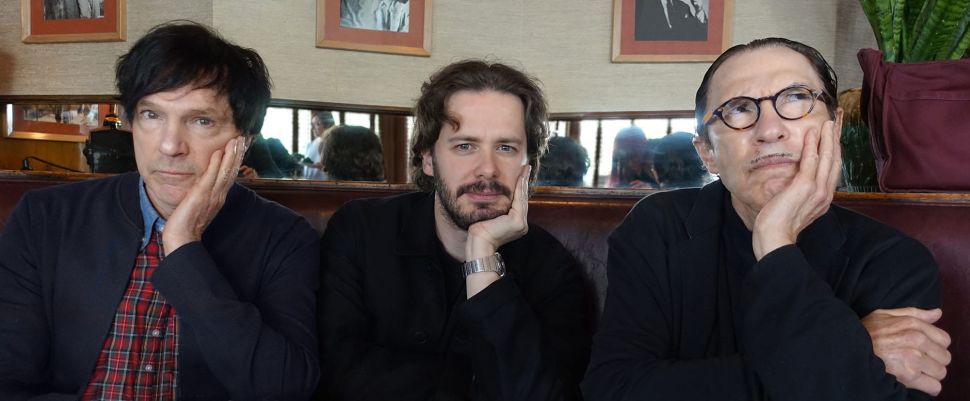

Russell Mael, director Edgar Wright and Ron Mael. Jake Polonsky / Focus Features
From Sparks’ perspective, they’ve had no choice but to repeatedly pick themselves up, dust themselves off and keep pushing the envelope. “We feel that the only way to move forward, the only way to have anything happen or have an audience be aware of what we are doing, is to continually come up with something new,†says Russell. “So if there’s a period when things aren’t going as well, the alternative isn’t to just get lazy and do nothing. For us, the alternative is to prove everybody wrong.â€
It’s that very resilience, combined with their unyielding discipline and musical shape-shifting, that strikes a powerful chord within Wright. “I’m so impressed by their endless innovation and their refusal to rest on their laurels and that they’re always reaching for something,†says Wright, who also marvels at the Maels’ integrity, always remaining true to themselves, no matter the cost. “I think the important thing with Ron and Russell is they’ve had success and failures on their own terms, and I guess that’s the only way you can really go through the business,†says Wright.
“It’s inherent in the way we work,†says Russell. “We don’t want to sacrifice any of that integrity at the risk of, ‘Oh, if we did this or this we might be more commercially acceptable,’ because it wouldn’t work and we wouldn’t even know how to do that anyway, to shape it into something that would work in a more mass way. So you have to at least have your integrity intact, or else you have kind of nothing.â€
Sparks weren’t aware of their far-reaching musical impact while it was happening — that they were, as Beck aptly describes them in the documentary, musical “bees†who pollinated the “ecosystem of music.†So it’s been sweet as honey for Sparks to discover their sweeping impact. “At the time The Sex Pistols were around, we had no clue we weren’t just being totally dismissed, like everything else that was being dismissed by The Sex Pistols,†says Ron. “To know that they liked what we were doing and it meant something to those people is really inspiring.â€
“And the breadth of the musical components that are in the documentary is, for us, really something special,†says Russell. “It goes from Steve Jones to Duran Duran and so much in between. The genres of music and the artists are so seemingly incompatible with each other. There’s Vince Clark, and Erasure was electronic, and the New Order folks, who were so kind about what they said about Sparks, and then Thurston Moore (Sonic Youth) where it’s a seemingly whole other world, or Faith No More, but then Jack Antonoff who has worked with Taylor Swift, so where does that fit in with Sparks? But it does in this way we’ve found out, so that’s pretty extraordinary to us.â€
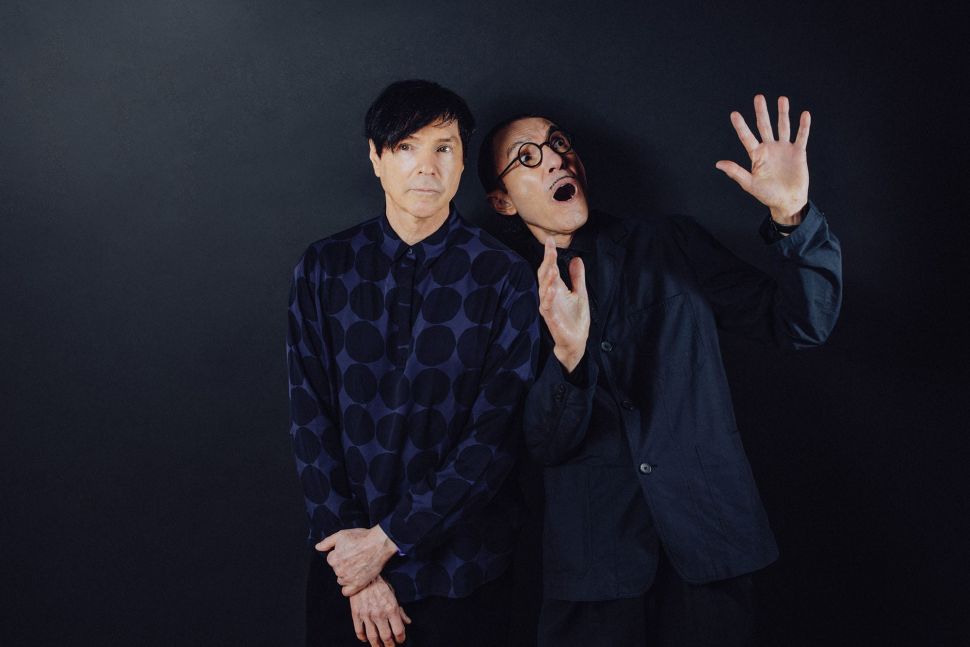

Russell and Ron Mael Anna Webber / Focus Features
Wright conducted all of the documentary’s interviews himself, an unconventional choice for a documentary filmmaker. “I’d never done a documentary before,†he says. “I didn’t really know what other people did or didn’t do, so one thing I learned that was unusual, where I was surprised, is I did all of the interviews. Sometimes with these documentaries, the director doesn’t necessarily do all the interviews. If the interviews seem quite laid back, unforced and informal in a nice way, it’s because I was just sitting around and chatting with these people.â€
As informative as they are relaxed, the interviews were all filmed in black and white, a tribute to fashion and portrait photographer Richard Avedon’s album cover for Sparks’ Big Beat record (1976). “I just think it’s such an iconic cover. It’s like one of my favorite images of Sparks,†says Wright. He notes the black and white interviews add a timeless feel and ensure equality among its interviewees. “In terms of the democratic feel of it, when you do those interviews, and they’re all shot in the same way, then there’s no difference between Julia Marcus, a Sparks fan, and Duran Duran. Everybody loves Sparks equally, so that was also the intention.â€
It would be hard to appreciate Sparks fully without being exposed to their various musical incarnations. Wright features their music prominently, allowing songs to play longer than music documentaries that relegate music to barely-there snippets. “There are music documentaries that are cut to within an inch of their lives, and that’s great if you’re The Beatles or The Rolling Stones and you don’t have to explain what the songs are,†says Wright. “But a lot of music documentaries just assume familiarity with the subject and, in that sense, don’t give you a chance to fall in love with them.â€
Apropos of their unprecedented career path, Sparks are poised for what may be their most commercially successful year yet. In addition to The Sparks Brothers, Annette, a film musical written by the Maels, directed by Leos Carax, and starring Marion Cotillard and Adam Driver, is set to debut on the opening night of Cannes Film Festival.
Beaming and clasping his hands together, Wright couldn’t be happier for Sparks. “It’s like the tortoise and the hare,†he says. “OK, so you made it in a different path to other bands. Unlike Queen, you didn’t go woosh and become superstars in the ’70s in quite the same way, but you’re still going in 2021. That’s really impressive. To still be doing it in their seventies, that’s really amazing. Watching Annette the other day, I knew it was going to be good, but I was still just thinking, ‘I love that you guys are not tapped out yet!’†he laughs. “I would be interested to see and hear what’s next because they seem to be unstoppable.â€
True to form, the industrious Sparks are already pushing forward, writing another film musical. They’re also working on a new Sparks record. What it will sound like is anyone’s guess. Naturally, the brothers will be the last to tell you. “It’s very Sparks-like in many ways, and you can fill in which era you hope it’s resembling,†says Russell. “It’s kind of hard to say.â€
“It’s not country and western,†he adds cheekily. “I suppose we owe Edgar a cameo in one of our songs, too.â€
The Sparks Brothers arrives in theaters June 18.

